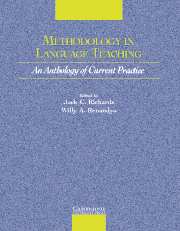Book contents
- Frontmatter
- Contents
- Acknowledgments
- Introduction
- Section I Approaches to Teaching
- Section 2 Lesson Planning and Classroom Management
- Section 3 Classroom Dynamics
- Section 4 Syllabus Design and Instructional Materials
- Section 5 Task and Project Work
- Section 6 Learning Strategies
- Section 7 Teaching Grammar
- Section 8 Teaching Pronunciation
- Section 9 Teaching Speaking
- Section 10 Teaching Listening
- Section 11 Teaching Vocabulary
- Section 12 Teaching Reading
- Section 13 Teaching Writing
- Section 14 Assessment
- Section 15 Technologies in the Classroom
- Section 16 Professional Development
- Chapter 39 The English Teacher as Professional
- Chapter 40 Developing Our Professional Competence: Some Reflections
- Chapter 41 Research in Your Own Classroom
- Credits
- Author Index
- Subject Index
- References
Chapter 40 - Developing Our Professional Competence: Some Reflections
Published online by Cambridge University Press: 10 November 2010
- Frontmatter
- Contents
- Acknowledgments
- Introduction
- Section I Approaches to Teaching
- Section 2 Lesson Planning and Classroom Management
- Section 3 Classroom Dynamics
- Section 4 Syllabus Design and Instructional Materials
- Section 5 Task and Project Work
- Section 6 Learning Strategies
- Section 7 Teaching Grammar
- Section 8 Teaching Pronunciation
- Section 9 Teaching Speaking
- Section 10 Teaching Listening
- Section 11 Teaching Vocabulary
- Section 12 Teaching Reading
- Section 13 Teaching Writing
- Section 14 Assessment
- Section 15 Technologies in the Classroom
- Section 16 Professional Development
- Chapter 39 The English Teacher as Professional
- Chapter 40 Developing Our Professional Competence: Some Reflections
- Chapter 41 Research in Your Own Classroom
- Credits
- Author Index
- Subject Index
- References
Summary
INTRODUCTION
For many, the melting snows of spring and burgeoning greenery signal the advent of a new year. For others, the new year began several months earlier, in January. For me, however, the new year begins in September with the start of a new school year. It is then that my pulse quickens in anticipation of the excitement of meeting new groups of students and seeing my colleagues again after the long, lazy summer. It is also at that time that I make my professional resolutions. I promise myself that I am going to spend more time with teachers, discussing educational issues and finding out about the realities of their teaching situations, their particular concerns, solutions, innovations, and strengths. I am going to read more and reflect on the implications of my reading. I am going to find time to work with more students, trying out ideas I have been exploring, honing new techniques, and learning more, always more about adult language learners and second language acquisition.
It is the time that I become particularly aware that I am both a teacher and a learner. For just as adult ESL students realize that learning English is a possibly lifelong process, so too have I realized that the development of professional competence is equally long-term and ongoing. At the beginning of a new year, I find myself reflecting on the implications of this realization for me as an adult ESL educator.
- Type
- Chapter
- Information
- Methodology in Language TeachingAn Anthology of Current Practice, pp. 393 - 396Publisher: Cambridge University PressPrint publication year: 2002
References
- 6
- Cited by

